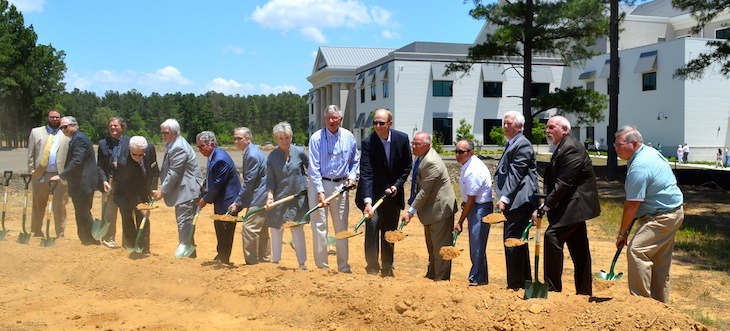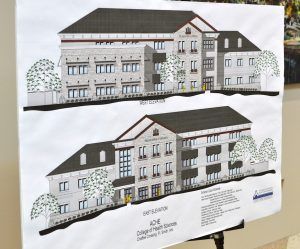ACHE breaks ground on College of Health Sciences, updates on ‘June-or-July’ commercial projects
by May 29, 2018 4:27 pm 2,547 views

Officials with and guest of the Arkansas Colleges of Health Education ceremonially break ground Tuesday (May 30) on the $25 million College of Health Sciences.
Ask any member of the Arkansas Colleges of Health Education (ACHE) staff and board to choose their favorite groundbreaking ceremony since first sticking shovel in the dirt over three years ago, and the answer is likely the same.
Tuesday, May 29, 2018.
When ACHE launched construction on its inaugural College of Osteopathic Medicine, they did so on a day of freezing temperatures with no students, no building, and scattered skepticism in a region that had never seen anything like it. With Tuesday’s ceremony for the College of Health Sciences at 7006 Chad Colley Boulevard, everything was different.
“It was just a little less than 1,200 days and 60 degrees difference from when we were here last on a barren piece of ground. That was then, this is now,” said Dr. Benny Gooden, executive director of institutional relations for the university. Like the former ceremony, Tuesday’s welcomed prominent members of the state and community, but it also was attended by members of the 86-strong faculty and support staff as well as some of the 150 students who just finished final exams from their first year at the college, which officially opened in August 2017.
“Those who doubted there would actually be more than just a startup medical school here can have all their doubts removed now. I know there were some who, even after seeing the medical school open, said, ‘Maybe so, but no other colleges will be here.’ Well, for them, and for all of us, today is the day. It’s real,” said Gooden, the former superintendent of Fort Smith Public Schools.
ACHE President Dr. Kyle Parker said the new college will house the doctor of physical therapy, doctor of occupational therapy, and physician’s assistant programs, “all of which is to serve the underserved.” The 66,000-square-foot facility-to-come will cost around $25 million, including construction, furniture, equipment, technology, and accreditation. It will result in 30 faculty positions with annual pay, on average, of $100,000 each.
Dr. Gooden, who helped oversee the program selection process, explained the physical therapy, occupational therapy, and physician’s assistant choices were made through a combination of national- and regional-focused research. At the national level, Gooden cited U.S. Bureau of Labor Statistics (BLS) findings that these were the “highest areas of need for the current decade.”
To answer if that was true regionally, Gooden said ACHE turned to the Economic Development Institute at the University of Arkansas at Little Rock (UALR) for an occupational needs assessment.

“We asked them to look at selected fields to focus on Arkansas, Oklahoma, Missouri, and Kansas. Because, at the end of the day, everything we do is regional. (Greg Hamilton) and his staff validated that the needs shown by the U.S. Department of Labor on a national level are also valid in our region.”
The College of Health Sciences is slated to welcome its first class of students in August 2020. ACHE announced it had received a $15 million anonymous gift to help make the college a reality in June of 2017. At that time, it also announced plans for a “planned zoning development” around the college. PZD is a type of building development and regulatory process that features designed grouping of varied and compatible land uses, such as housing, recreation, commercial centers, and industrial parks, within one contained development or subdivision.
On Tuesday, Parker addressed how the commercial aspects were progressing, telling Talk Business & Politics ACHE is “breaking ground right across the street (from the College of Health Sciences) in June or the first part of July” on “two 45,500-square foot facilities that are being built with over 32,000 square feet of retail space built into that — 16,000 per side — and over 80% of that is already leased out.” Parker could not name any of the tenants Tuesday, only saying he was “very excited” to make those announcements soon.
